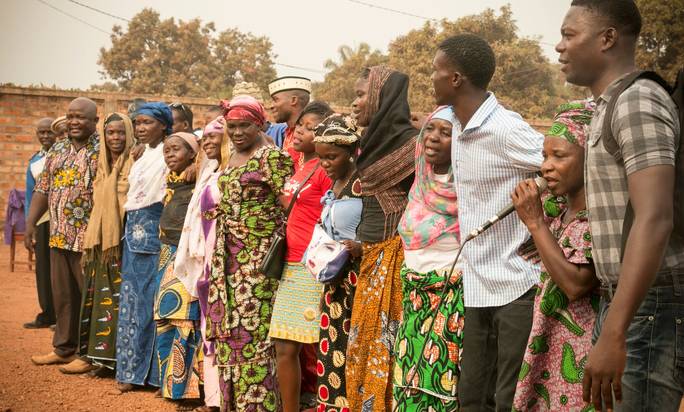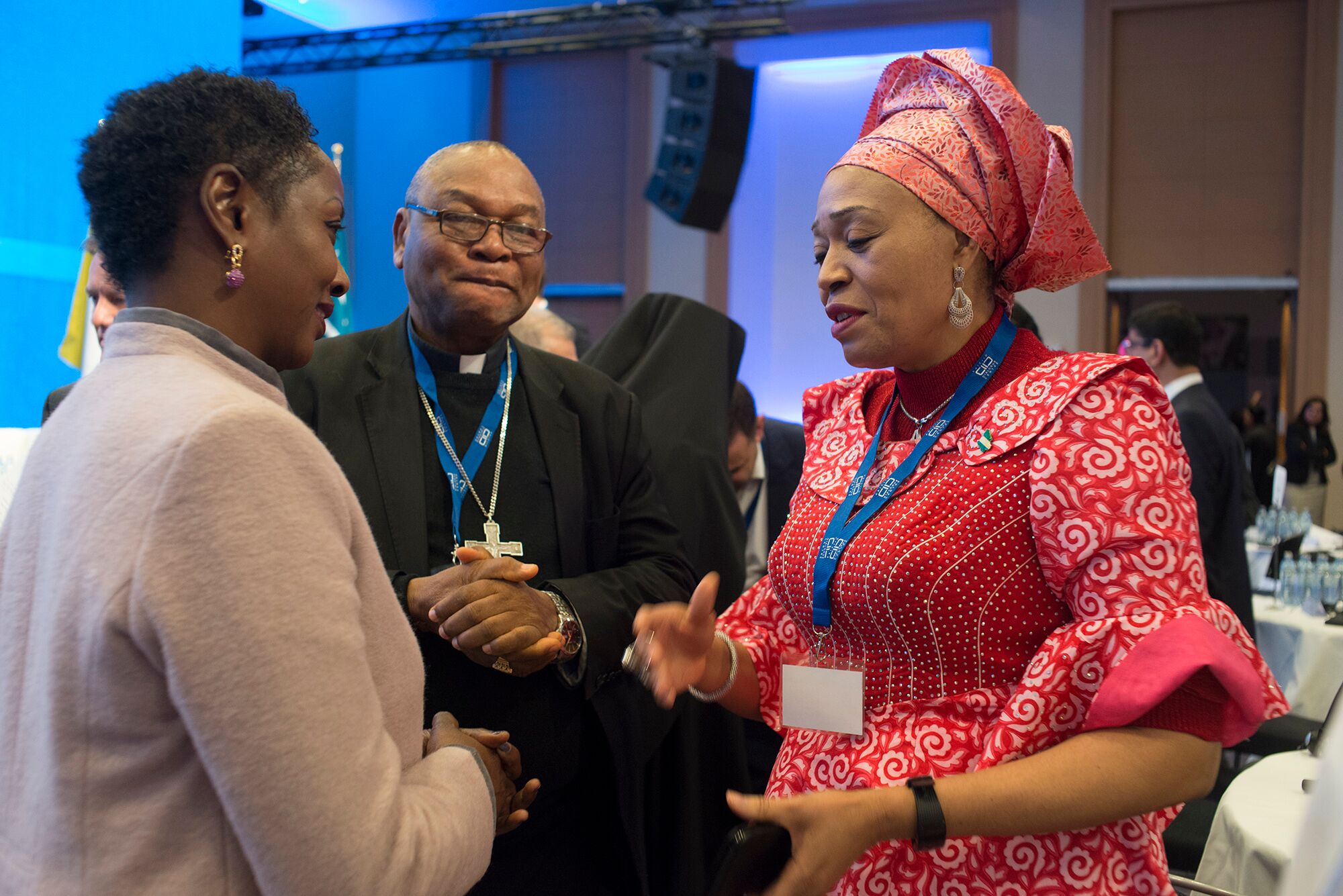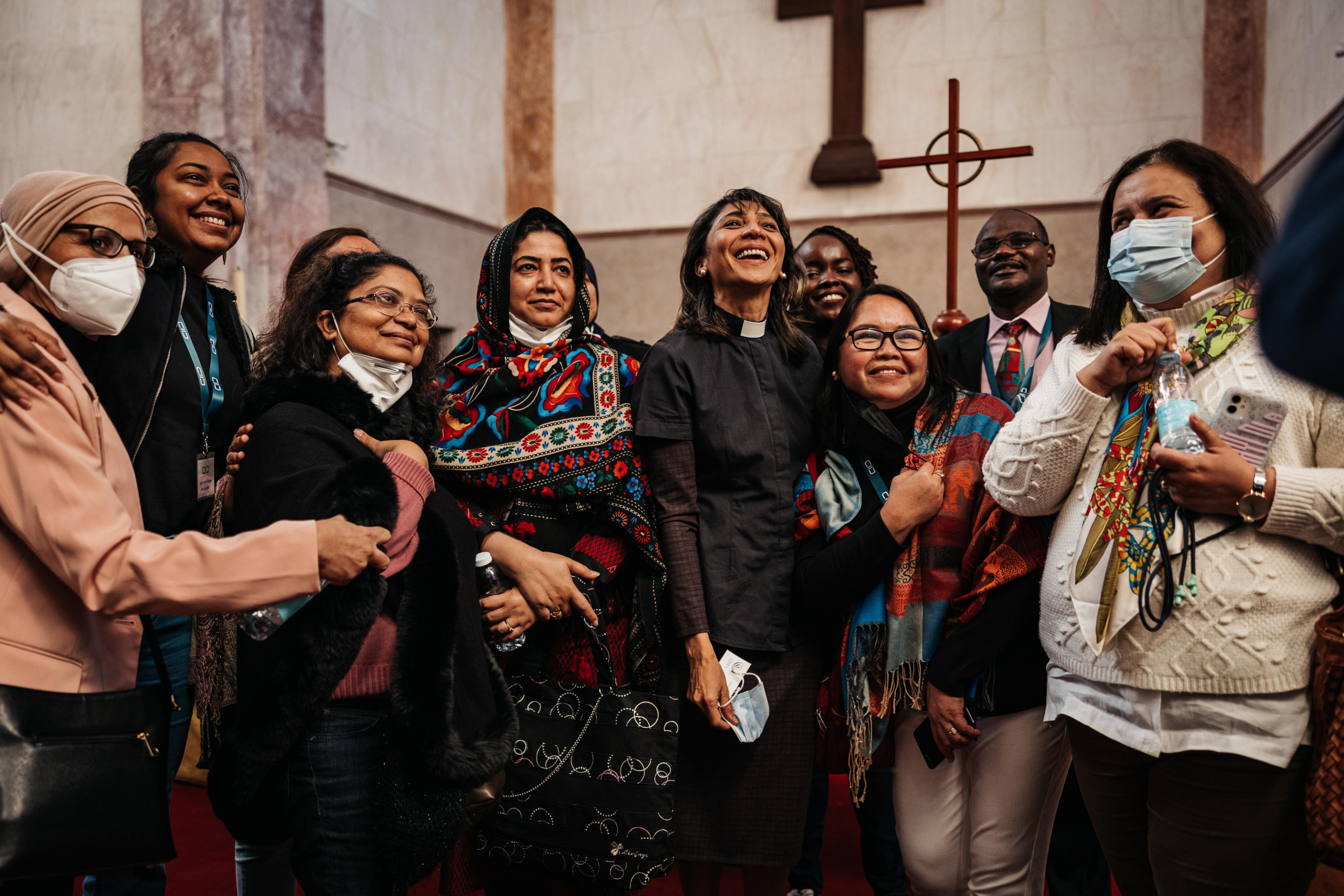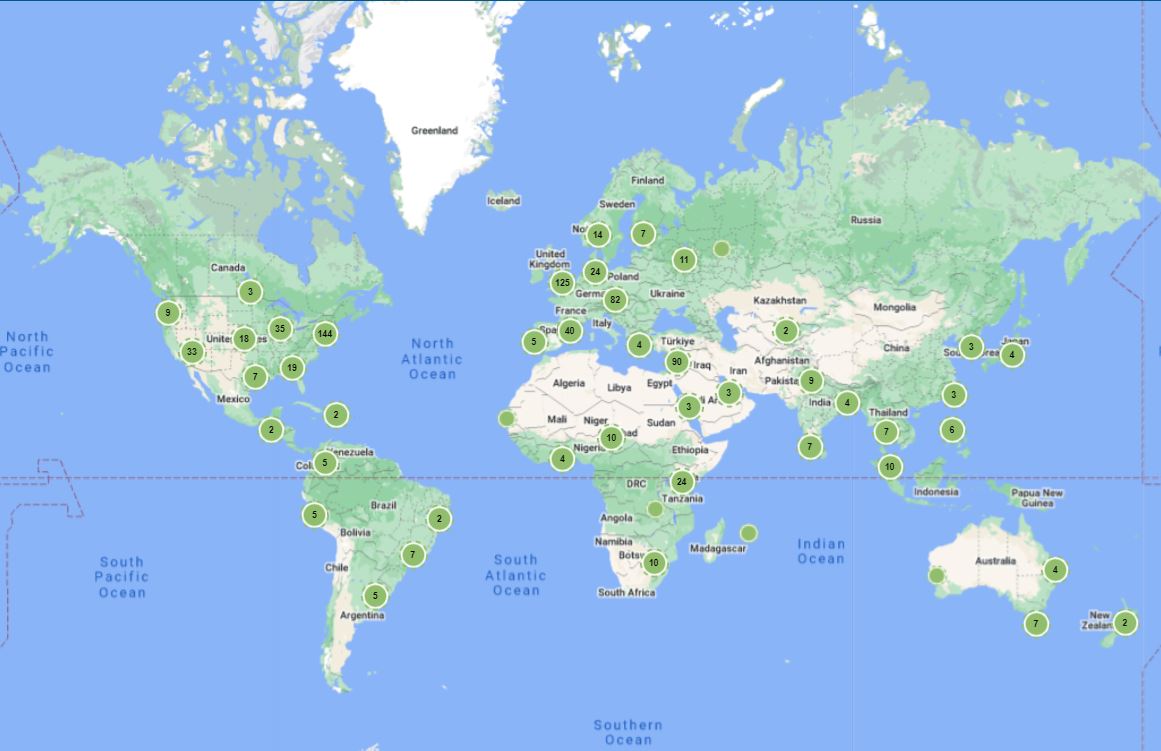Promising Practices
Promising Practices is a collation and expansion of existing documentation on promising practices in interreligious dialogue. Our database offers guidelines and focuses on the concrete implementation of interreligious and intercultural dialogue practices around the world.

Disclaimer:
Through providing different aspects and ideas our aim is to compliment the great work that has been already done in the field of Interreligious and Intercultural Dialogue. Information and field data published in this resource are for informational purposes only, and neither KAICIID nor the Dialogue Knowledge Hub guarantee in any way success of the implementation of the activity.
While we wish all the activities and initiatives featured in this resource could be replicable in as many context around the world as possible, there are often certain limitations, such as the suitability for particular cultures or religious communities. However, there is always room to explore and adjust activities in regards to the community’s environment.
- Guatemala
- Rwanda
- South Africa
- Sri Lanka
- Advocacy
- Capacity Building & Empowerment
- Confessional / Religious / Spiritual Activities
- Democracy
- Diplomacy
- Educational Programmes
- Freedom of Religion and Belief
- Human Security
- Humanitarian Aid
- Intercultural Dialogue
- Interreligious Dialogue
- Intrareligious Dialogue
- Networking
- Peace
- Pluralism
- Shared Human Values
- Social Cohesion & Citizenship
- Social Work & Community Service
- Youth
- Buddhism
- Islam
- Multireligious
Interfaith Conflict Mediation
Interfaith conflict mediation can take different forms, from democratic empowerment in post-conflict environments, to material exchanges and dialogue to reconcile. When a conflict arises between two protagonists that have cultural and religious differences, mediation has to be fair and objective; it should not favor one over the other. Intercultural Conflict mediation ensures that each perspective and belief are taken into account in the mediation process.
The Interfaith Democratic Empowerment is a program put in place by the religious leaders of a given country. They organize constitution reading workshops, debates, give their communities the judicial and advocacy tools to be active citizens in democracy building.
Interfaith material exchanges help establish a dialogue when it is hard for people to have verbal interactions with one another. Different religious communities can decide to work on a solidarity program with a specialized organization. These programs can take place through the year in villages or cities of religious communities or interfaith groups, to show that solidarity is a common value shared by all.
“Religions to Reconcile” uses religion as a means to reconcile and unite people. This initiative implements reconciliation in environments or countries where religious identities often oppose each other and engage in conflict, thus engages them to come together and build a better society.
- Global
- Guatemala
- Lebanon
- Malaysia
- USA
- Capacity Building & Empowerment
- Confessional / Religious / Spiritual Activities
- Diplomacy
- Educational Programmes
- Freedom of Religion and Belief
- Human Security
- Humanitarian Aid
- Intercultural Dialogue
- Peace
- Shared Human Values
- Social Work & Community Service
- Women's Rights
- Youth
- Christianity
- Hinduism
- Islam
- Judaism
- Multireligious
Interfaith Volunteering
This promising practice happens in multi-religious societies throughout the whole year, and is based on a citywide network of diverse faith communities, which provides resources and temporary housing for families experiencing homelessness. Different religious communities come together to lead cooperative societal projects. They partner up with local authorities to create links between religious communities, through social work. Young people from different religions are encouraged to give their time to a communal service, or get together to cook and distribute food to homeless people, either on the streets or in community centres. Associations are actively working for the development of communities in need, seeking young volunteers from different religious backgrounds who would assist remote and isolated communities. Their goal is to challenge the traditional way of community building and development, by incorporating a social purpose into the practice. Community development has equally important economic and social effects, thus this practice assists precarious villages or neighborhoods throughout the year, and gives them a sense of community that they don’t often have because of their isolation, for
- Peru
- Sri Lanka
- USA
- Advocacy
- Capacity Building & Empowerment
- Confessional / Religious / Spiritual Activities
- Democracy
- Diplomacy
- Educational Programmes
- Freedom of Expression
- Freedom of Religion and Belief
- Information Distribution
- Intercultural Dialogue
- Interreligious Dialogue
- Networking
- Peace
- Pluralism
- Shared Human Values
- Social Cohesion & Citizenship
- Women's Rights
- Youth
- Christianity
- Indigenous Traditions
- Islam
- Multireligious
Interfaith Travel
Interfaith learning through international and interfaith travel to different countries, as well as weekend immersion trips to local houses of worship help build trust and relationships. In every conflict or area of tension, there are different sides to the story. The dual narrative tourism initiative is meant to provide visitors with two successive different narratives from two different guides, each one narrating their own perspective, for them to build their own opinion and expand their understanding of the situation. This practice can also take the form of visits to different religious spaces. Opening one’s religious space to others is a way of showing a facet of one’s religious identity and break down misconceptions. Inviting people to visit a place of worship is an opportunity to increase awareness and educate participants about a particular religion, answer questions and reinforce one’s faith through.
Interfaith travel can involve visiting different regions or countries. Interfaith region consists of touring one given region to shed light on similarities in terms of religious integration. Hence, this practice uses travel and tourism to focus on the question of identity and culture regardless of faith, and fosters interfaith unity through initiating discussions on interreligious similarities and differences.
Moreover, in countries where there are still indigenous communities, city-dwellers and these communities are not well-linked, as they live far away from the cities and are rather isolated. Interfaith travel can enable people from the city to reconnect with their backgrounds and the way their ancestors use to live, in order to recreate a link between all communities and to promote and support the indigenous way of life.
- Czech Republic
- India
- Ireland
- Lebanon
- Poland
- Russia
- Confessional / Religious / Spiritual Activities
- Diplomacy
- Freedom of Religion and Belief
- Intercultural Dialogue
- Interreligious Dialogue
- Intrareligious Dialogue
- Networking
- Peace
- Youth
- Buddhism
- Christianity
- Hinduism
- Jainism
- Judaism
- Multireligious
Interfaith Prayer
The practice of interfaith prayer is an initiative that can take place anytime, anywhere. It is especially appropriate when there is a natural disaster or tragedy affecting a community. It can also be used during times of peace. Interfaith prayers aim to emphasize the common values of the religions involved. It can also be used when and important religious leader passes away. This gives believers of different faiths the opportunity to come together in an act of solidarity and goodwill. Another form of interfaith prayer involves believers from different denominations of the same religion uniting for prayers at the same location and praying in the same language. This aims at compensating for reduced resources of religious minorities, while giving participants the opportunity to unite with people of different practices in a common prayer. An organization can also invite individuals to a gathering, where they reflect on scriptures from different religions. These workshops emphasize the similarities between religions, instead of just highlighting the differences. Interfaith prayers require a space where individuals can gather, regardless of their faith, to observe a moment of prayer, meditation, or silence, thus share a spiritual moment side by side.
- Costa Rica
- Cyprus
- Ireland
- Madagascar
- Rwanda
- USA
- Advocacy
- Capacity Building & Empowerment
- Confessional / Religious / Spiritual Activities
- Democracy
- Diplomacy
- Educational Programmes
- Environment
- Freedom of Expression
- Freedom of Religion and Belief
- Information Distribution
- Intercultural Dialogue
- Interreligious Dialogue
- Intrareligious Dialogue
- Networking
- Peace
- Pluralism
- Shared Human Values
- Social Cohesion & Citizenship
- Social Work & Community Service
- Youth
- Bahai Faith
- Christianity
- Islam
- Judaism
- Multireligious
Youth Empowerment
It is important to train and empower the youth to engage in interfaith dialogue and activities, for they are the future of societies, communities, and nations. Youth can be engaged through intensive activities and events for high school students from various religious backgrounds. Students can gather from across a country to participate in discussions, visit different houses of worship, engage in workshops on religions, spirituality, peacemaking, and leadership, and translate beliefs into action through service and justice events. The practice is supervised by mentors, and empowers young people to be leaders for social change and to foster relationships across religious communities. The youth can also be trained to be successful peace ambassadors. Young individuals of all faiths receive training on peace and interfaith dialogue throughout the year. The organization in question thus insures that the next generation is putting their learned skills to good use, and is capable of taking on responsibilities in the future. Other activities can also teach the youth conflict mediation. For example, “Better your Country”, a two-day event based on interfaith dialogue as a means to appease tensions among society, puts the youth at the forefront of mediation, and engages them in discussions on conflicts or issues affecting the country. This event aims at gathering young people from different cultural backgrounds and beliefs to display and share a variety of narratives and opinions.
Classrooms are also a great environment to foster interfaith dialogue and youth empowerment. An easy activity that can be implemented is the Love Dice, a paper-made educative tool. It aims to teach students about shared human values by playing with the Love Dice each morning and establish a goal for each day. On each side of the Dice students write universal values of caring and love, and thus playing with the Dice empowers them to share their cultures, beliefs, and their values based on the chosen universal value that they throw for that day. This goal revolves around treating others how one would wish to be treated, regardless of their cultural or religious identity. Moreover, interfaith dialogue and empowerment can be implemented through the educational curriculum.
Extra-curricular activities such as camps and scouts are a rife space for youth engagement and training. The InterFaith Youth Camp gives youth the opportunity to engage in change and contribute to their society and community. This small camp provides them with knowledge and gives them a space to build friendships from different religious, faith, and cultural communities. Similarly, the scout movement can enable young people of different backgrounds to meet through the scout movement. In Madagascar, people of the three different Scout branches (Catholic, Protestant and Lay) have decided to join hands in order to create more collective activities.
This practice welcomes children of all backgrounds and embraces their individual identities. It acknowledges the child’s experience, affirms their core sense of identity and belonging, and seeks to nurture their developing sense of environments and communities (home, school, local community, and faith or belief community, civil society). It endorses the youth’s faith and belief, thus it influences their sense of identity and belonging while it nurtures their sense for justice and peaceful coexistence.
- Cyprus
- Oman
- Rwanda
- USA
- Advocacy
- Capacity Building & Empowerment
- Confessional / Religious / Spiritual Activities
- Democracy
- Diplomacy
- Educational Programmes
- Environment
- Freedom of Expression
- Freedom of Religion and Belief
- Information Distribution
- Intercultural Dialogue
- Interreligious Dialogue
- Intrareligious Dialogue
- Networking
- Peace
- Pluralism
- Social Cohesion & Citizenship
- Buddhism
- Christianity
- Islam
- Judaism
- Multireligious
Interfaith Art
Art can be an innovative practice to promote interfaith dialogue and peaceful coexistence. Through exhibitions, murals, or classes, individuals of different backgrounds can unite together and create art that transcends beliefs and clashes. A community or an organization can organize an exhibition on particular characteristics of a religion to present to other faiths, to engage in understanding, interfaith dialogue and coexistence. Moreover, local artists can work with faith-based communities, local residents, and college students to produce murals that reflect shared values and hopes for their neighbourhood, therefore bridging religious, socio-economic, racial, and generational divides. For people who cannot use words to express how they feel or those who are subject to oppression, art can be a peaceful way of expression and protest. Art products can be gathered in a free exhibition in a public area to raise awareness. Ultimately this practice pushes participants to ponder and evaluate their preconceived ideas and prejudices through art.
- Costa Rica
- India
- Peru
- South Africa
- USA
- Advocacy
- Capacity Building & Empowerment
- Confessional / Religious / Spiritual Activities
- Democracy
- Diplomacy
- Educational Programmes
- Environment
- Freedom of Movement
- Information Distribution
- Intercultural Dialogue
- Interreligious Dialogue
- Intrareligious Dialogue
- Networking
- Peace
- Physical Infrastructure
- Shared Human Values
- Social Cohesion & Citizenship
- Christianity
- Islam
- Judaism
- Multireligious
Environment Campaign
By organising an environmental campaign, whether through trips to a public space, creating eco-villages, or fasting for the climate, this practice can bring people of different religions and backgrounds together to unite around the same values. They get together to work on a project designed to take care of the environment and to raise awareness of and advocate for it. Depending on the needs, the practice can be organised by religious communities, NGOs, schools and/or any level of government, as well as by any committed individuals. By promoting environmental issues, this promising practice can inspire people to collaborate, work with each other against their differences, and be environmentally friendly, thus it increases interfaith awareness and creates a space to gather and protect nature.




